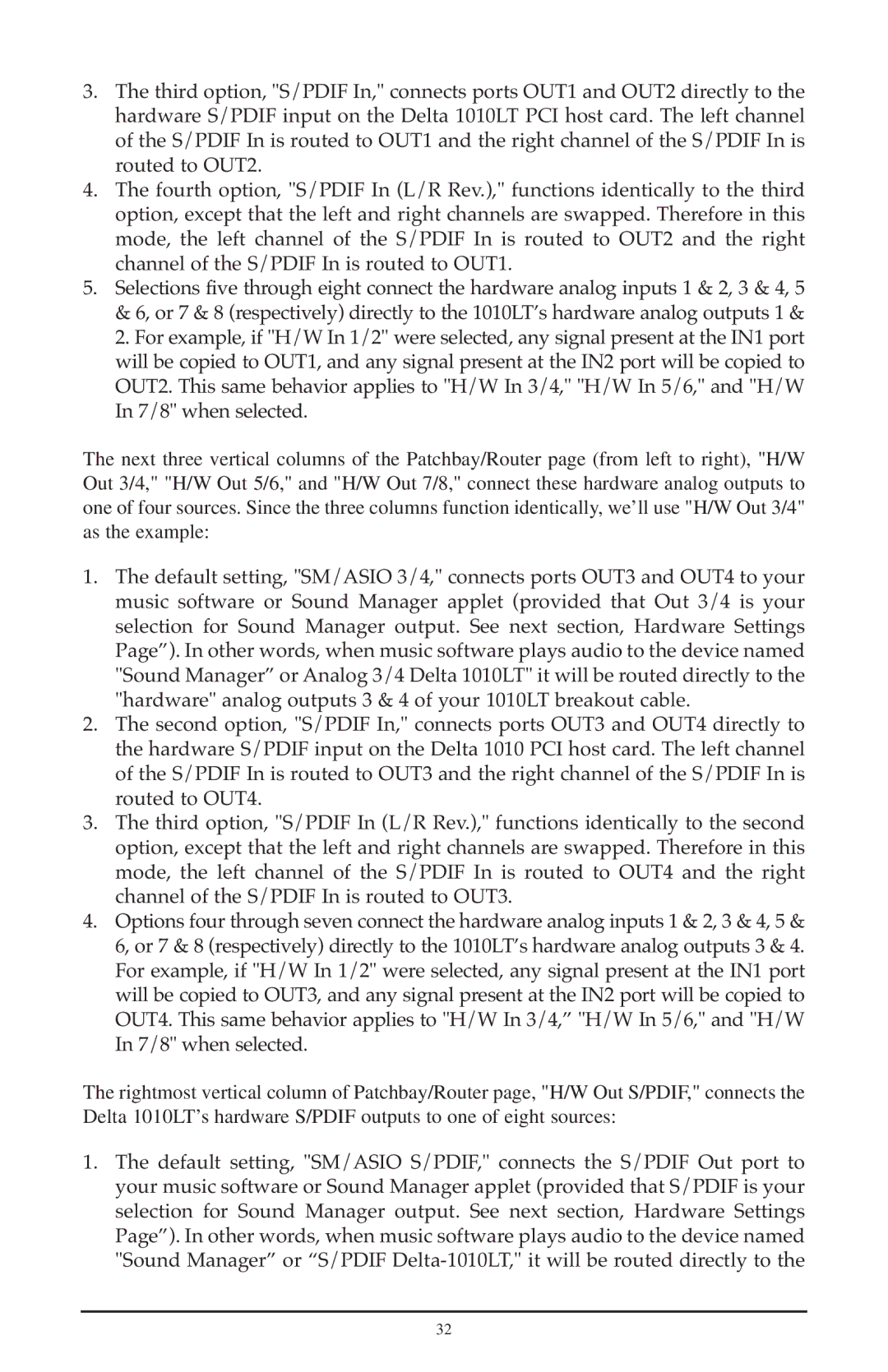3.The third option, "S/PDIF In," connects ports OUT1 and OUT2 directly to the hardware S/PDIF input on the Delta 1010LT PCI host card. The left channel of the S/PDIF In is routed to OUT1 and the right channel of the S/PDIF In is routed to OUT2.
4.The fourth option, "S/PDIF In (L/R Rev.)," functions identically to the third option, except that the left and right channels are swapped. Therefore in this mode, the left channel of the S/PDIF In is routed to OUT2 and the right channel of the S/PDIF In is routed to OUT1.
5.Selections five through eight connect the hardware analog inputs 1 & 2, 3 & 4, 5 & 6, or 7 & 8 (respectively) directly to the 1010LT’s hardware analog outputs 1 & 2. For example, if "H/W In 1/2" were selected, any signal present at the IN1 port will be copied to OUT1, and any signal present at the IN2 port will be copied to OUT2. This same behavior applies to "H/W In 3/4," "H/W In 5/6," and "H/W In 7/8" when selected.
The next three vertical columns of the Patchbay/Router page (from left to right), "H/W Out 3/4," "H/W Out 5/6," and "H/W Out 7/8," connect these hardware analog outputs to one of four sources. Since the three columns function identically, we’ll use "H/W Out 3/4" as the example:
1.The default setting, "SM/ASIO 3/4," connects ports OUT3 and OUT4 to your music software or Sound Manager applet (provided that Out 3/4 is your selection for Sound Manager output. See next section, Hardware Settings Page”). In other words, when music software plays audio to the device named "Sound Manager” or Analog 3/4 Delta 1010LT" it will be routed directly to the "hardware" analog outputs 3 & 4 of your 1010LT breakout cable.
2.The second option, "S/PDIF In," connects ports OUT3 and OUT4 directly to the hardware S/PDIF input on the Delta 1010 PCI host card. The left channel of the S/PDIF In is routed to OUT3 and the right channel of the S/PDIF In is routed to OUT4.
3.The third option, "S/PDIF In (L/R Rev.)," functions identically to the second option, except that the left and right channels are swapped. Therefore in this mode, the left channel of the S/PDIF In is routed to OUT4 and the right channel of the S/PDIF In is routed to OUT3.
4.Options four through seven connect the hardware analog inputs 1 & 2, 3 & 4, 5 & 6, or 7 & 8 (respectively) directly to the 1010LT’s hardware analog outputs 3 & 4. For example, if "H/W In 1/2" were selected, any signal present at the IN1 port will be copied to OUT3, and any signal present at the IN2 port will be copied to OUT4. This same behavior applies to "H/W In 3/4,” "H/W In 5/6," and "H/W In 7/8" when selected.
The rightmost vertical column of Patchbay/Router page, "H/W Out S/PDIF," connects the Delta 1010LT’s hardware S/PDIF outputs to one of eight sources:
1.The default setting, "SM/ASIO S/PDIF," connects the S/PDIF Out port to your music software or Sound Manager applet (provided that S/PDIF is your selection for Sound Manager output. See next section, Hardware Settings Page”). In other words, when music software plays audio to the device named "Sound Manager” or “S/PDIF
32
